 Jeffrey Wells
Jeffrey Wells
Post-LAFCA/BFCA Poker: Spotlight Backpat + Resurgence of Mad Max: Fury Road, Paul Dano, KStew
Today’s Oscar Poker chat, a three way between myself, Awards Daily‘s Sasha Stone and Awards Watch‘s Erik Anderson, was an attempt to take stock of things in the wake of the last few award hand-outs — NBR, NYFCC, BOFCA, BFCA and LAFCA. We had plenty to chew on. Again, the mp3.
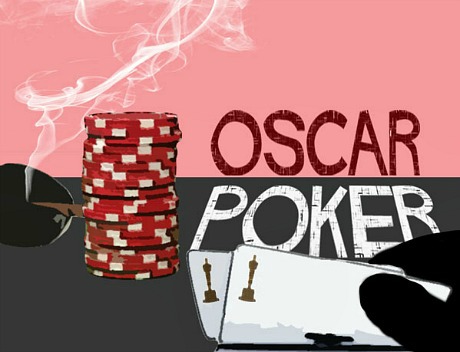
LAFCA Goes For Spotlight re Best Picture, Screenplay; Fassbender, Rampling, Vikander and Shannon Take Acting Honors
The Los Angeles Film Critics Association — often contrarian as far as old-fart Academy thinking is concerned, often looking out for their pet ponies, sometimes preciously inclined — has done the right thing, I feel, by giving the org’s Best Picture award to Tom McCarthy‘s Spotlight. Ditto their honoring Max Max: Fury Road‘s George Miller with their Best Director award — yay, George! LAFCA also gave their Best Actor trophy to Michael Fassbender for his hard-hammer performance in Steve Jobs (Son of Saul‘s Geza Rohrig came in second), and their Best Actress award to 45 Years‘ Charlotte Rampling (who edged out Brooklyn‘s Saoirse Ronan).
Ex Machina/Danish Girl‘s Alicia Vikander was named Best Supporting Actress and 99 Homes/Freeheld‘s Michael Shannon was handed LAFCA’s Best Supporting Actor award. The Best Screenplay award went to Josh Singer and Tom McCarthy for Spotlight, and Asif Kapadia’s Amy was named best documentary. Anomalisa won the Best Animated Film award over Inside Out — somebody finally said “sorry, not this time” to Pixar! John Seale‘s cinematography for Mad Max: Fury Road was also awarded; ditto Colin Gibson‘s production design for that film. Carter Burwell won for best musical score for both Anomalisa and Carol. The Best Editing award went to The Big Short‘s Hank Corwin. LAFCA’s previously announced recipient of their 2015 Career Achievement honoree is editor Anne V. Coates.
From a participant: “Just so you know, there was no sense of consensus for Best Picture. The votes were spread all over the place, more than any other year I’ve witnessed. There was no clear frontrunner.”
Schmooze, Celebrate, Brunch Munch
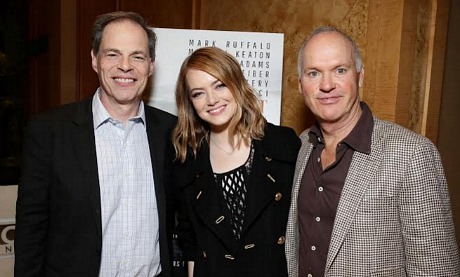
(l. to .r.) Open Road CEO Tom Ortenberg, Emma Stone, Spotlight star Michael Keaton after screening of Tom McCarthy’s film at ICM screening room — Wednesday, 12.3.
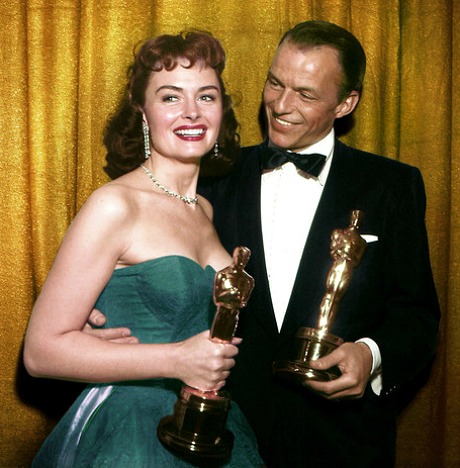
From Here To Eternity Oscar winners Donna Reed, Frank Sinatra during press-room photo session following 1954 Academy Awards.
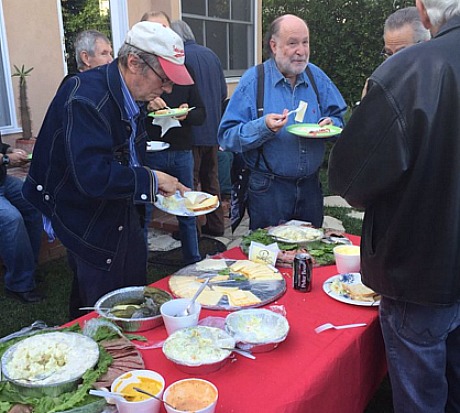
LAFCA members enjoying their brunch while online columnists the world over wait patiently for them to finish. Thanks, guys! How was the potato salad?


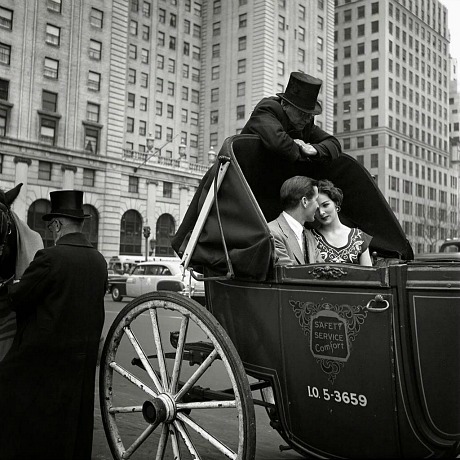
Beantown Crix Embrace Spotlight, Dano/DiCaprio, Rampling, Rylance, Stewart
What’s up with critics relentlessly handing out Best Supporting Actress awards to Kristen Stewart for her performance in Clouds of Sils Maria? NYFCC, Boston Online Film Critics and today’s Boston Film Critics awards…she was very good in that 2014 Olivier Assayas film (shot in ’13, premiered in Cannes 19 months ago) but calm down. (Update: Stewart was also the LAFCA runner-up for their BSActress award.) How about giving an occasional Best Supporting Actress award to a performance from a 2015 film now and then? What about the entirely deserving Elizabeth Banks performance in Love & Mercy or that show-stopping Jane Fonda performance in Youth? Seriously, this Stewart vogue has to stop. Otherwise hey-hey for Love & Mercy‘s Paul Dano sharing the Beantown Best Actor award with The Revenant‘s Leonardo DiCaprio. And hooray for Spotlight winning Best Picture and Best Screenplay. Here’s the Variety report.
Arclight Revenant Greeting
…as you come down the main lobby stairs, or rather as I came down them last Thursday night…wham.
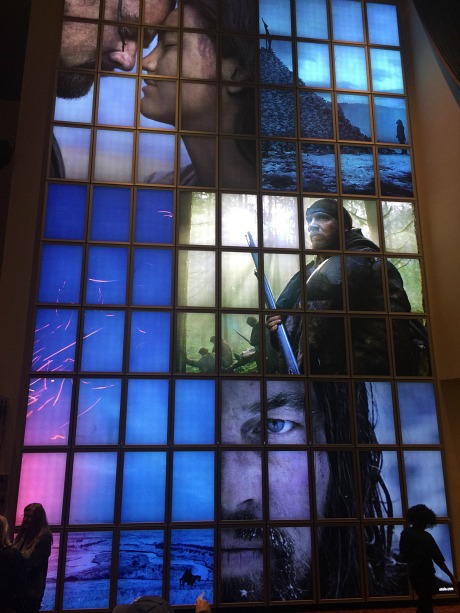
Lobby Chat With Amy Maestro
The day before yesterday I spoke with Asif Kapadia, the director of the highly praised, Oscar-favored Amy, which has so far won the National Board of Review’s Best Documentary award as well as the same honor from the Satellite Awards. We met at the too-cool-for-school Standard Hotel with all the intense ice-blue colors and the hot babes roaming around. I began with my standard beef that almost all musician biopics (be they doc or narrative) are about self-destruction — dying young from drugs and alcohol abuse. Whether it’s Amy Winehouse, Hank Williams, Nina Simone, Janis Joplin, Jim Morrison, Charlie “Bird” Parker, Edith Piaf or Bix Beiderbecke — it’s the same damn story every time. They grew up hard, found fame with their great gift, burned brightly for a relatively brief time and then keeled over. Kapadia offered a smart and spirited retort, of course, and we were off to the races. Here’s the mp3.

Amy director Asif Kapadia — Friday, 12.4, 3:40 pm, lobby of Standard Hotel.
From my 7.2.15 review: “I came out of Asif Kapadia‘s Amy with a sense of sadness, of course. But I didn’t have any one reaction, to be honest. Ten minutes after the screening ended I bought Back to Black. When Amy Winehouse was great, which was nearly every time she sang, she was insanely great. But she was a mess for so long and such a foregone conclusion in terms of an early death that when it finally happened it was hardly a shock. It was almost a relief because at least the tortured aspects of her life had come to an end. That sounds a bit heartless but some people seem so bound for oblivion that you can’t help but feel a certain distance and disinterest.
Comb Security
I’m always losing combs so I always carry two or three in my back pocket. But I don’t like the hard, inflexible kind that cost $2 or $3 bills each in pharmacies. I like the cheap, flexible, soft-plastic kind they sell in liquor stores for 90 cents or whatever. I like the teeth of a comb to have a little “give.” Two days ago I hit paydirt when I visited Terner’s liquor store on the Strip (i.e., right next to the Viper Room). For a lousy $2 dollars and change they were selling a whole plastic bag’s worth of cheap combs. I’m now carrying ten flexible combs in my rear pockets — five black, two lime-green and three violet. I’m thinking of buying another bag of these guys so I can replace the current ten, all of which I’ll lose sooner or later.
They’re Voting!
Sasha Stone, Awards Watch‘s Erik Anderson and I are waiting for the Los Angeles Film Critics Association and the Boston Film Critics to finish voting on their year-end awards before recording the latest Oscar Poker podcast. Wells to Stone, Anderson: “You want to wait so we can discuss the MOMENTOUS, EARTH-SHAKING DECISIONS made by LAFCA and the Boston Film Critics? What do they know? Do they have midi-chlorians in their bloodstream and therefore their year-end picks are something extra-noteworthy?” Question: will LAFCA continue its beyond-lame tradition of stopping voting midstream so they can stuff their faces with brunch vittles? I’m hoping/trusting that at least one of these groups will belly up to the bar for Spotlight, and if that doesn’t happen I don’t know what.


Mellow Wells vs. Irked Russell on Terrorists, San Bernardino, Gun Culture, Gun Controls, etc.
Hateful Eight star Kurt Russell and I were having a nice enough interview earlier today, talking not just about Quentin Tarantino‘s soon-to-open film and Russell’s flinty, craggy-voiced performance as a tough-talking bounty hunter named John Ruth, but also, briefly, about a possible film version of Chapman and MacLain Way‘s The Battered Bastards of Baseball.
Released in 2014, Battered Bastards was and is a wonderful doc about a scrappy-ass, mid ’70s minor-league Portland baseball team (called the Mavericks) that was owned and managed by Kurt’s dad, character actor Bing Russell. Russell said that Todd Field might direct with Russell possibly playing his dad…or not. Too early to say but here’s hoping.
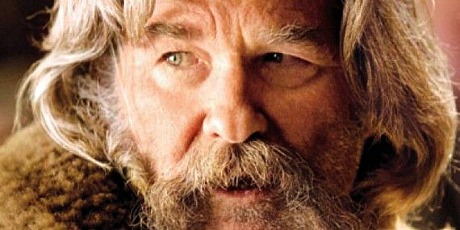 Kurt Russell as snarly-mouthed John Ruth in Quentin Tarantino’s The Hateful Eight.
Kurt Russell as snarly-mouthed John Ruth in Quentin Tarantino’s The Hateful Eight.Then I segued into a riff about how movies tend to reflect the times and the culture they come from. I was thinking that the Quentin Tarantino brand, which has always included a swaggering, half-smirking, bordering-on-flippant use of violence at times, might not fit or reflect the post-Paris, post-San Bernardino culture now as well as it did the all-is-well Clinton ’90s.
I was thinking in particular of a 12.3 N.Y. Times survey piece I read this morning. Written by N.R. Kleinfeld and called “Fear in the Air, Americans Look Over Their Shoulders,” it basically observed that “a creeping fear of being caught in a mass rampage has unmistakably settled itself firmly in the American consciousness.” And I was wondering how that wink-wink grindhouse blood and brutality that colors the second half (and more precisely the final third) of Tarantino’s film is going to synch with that…or not.
Here’s a reasonably close transcript of our gun-and-culture discussion. I guess it wasn’t so much a discussion as a kind of argument, except it was more about Russell arguing with me than vice versa. I played it cool and made my points in a mild-mannered way. Listen and judge for yourself:
Wells: The Quentin cult, if you will, is, like, 23 years old, starting with Reservoir Dogs…right? Violence as attitude, violence as style, violence as fashion…not dealt with in an earnest, realistic way. The swagger thing.
Russell: Right.
Wells: And I was looking in the N.Y. Times this morning and this guy interviewed several people in the country in the Midwest and West. And with almost everybody out there, he reported, there’s a feeling of anxiety in the culture…when’s the next one?
Russell: So how do you connect the dots?
“Good-Tasted To Death”
My 9.13.15 review of Tom Hooper’s The Danish Girl, reposted in the wake of pic’s 11.27 release: “The notion that Eddie Redmayne might win a second Best Actor Oscar for his performance as Einer Wegener/Lili Elbe in Tom Hooper‘s The Danish Girl (Focus Features, 11.27) died last night in Toronto.
“Okay, it didn’t die but it certainly downshifted. And the cause of that downshift was the film itself, a reasonably decent effort which screened for press & industry yesterday morning and the public last night. It seemed to play well enough, but it didn’t seem to lift anyone off the ground either. And Redmayne seems caught in a kindly web of calculation. As submissive and devotional and brave as his performance is — you have to give him credit and respect for really letting Lili into his soul — the effort is gently muffled by Lucinda Coxon‘s script (based on David Evershoff‘s same-titled book) and Hooper’s direction, which feels overly poised and burnished and finally confining.
“The Danish Girl is a finely rendered, exquisitely sensitive, middle-of-the-road Oscar-bait film that will win respect and applause among the 50-plus Hollywood guild & Academy set. But it’s almost bloodless — well acted, handsomely captured and intriguing to some extent, lulling and softly emotional but never fascinating and absolutely dead fucking terrified of doing or saying anything that might be construed as brash or nervy or irreverent or out of synch with today’s p.c. drumbeat.

